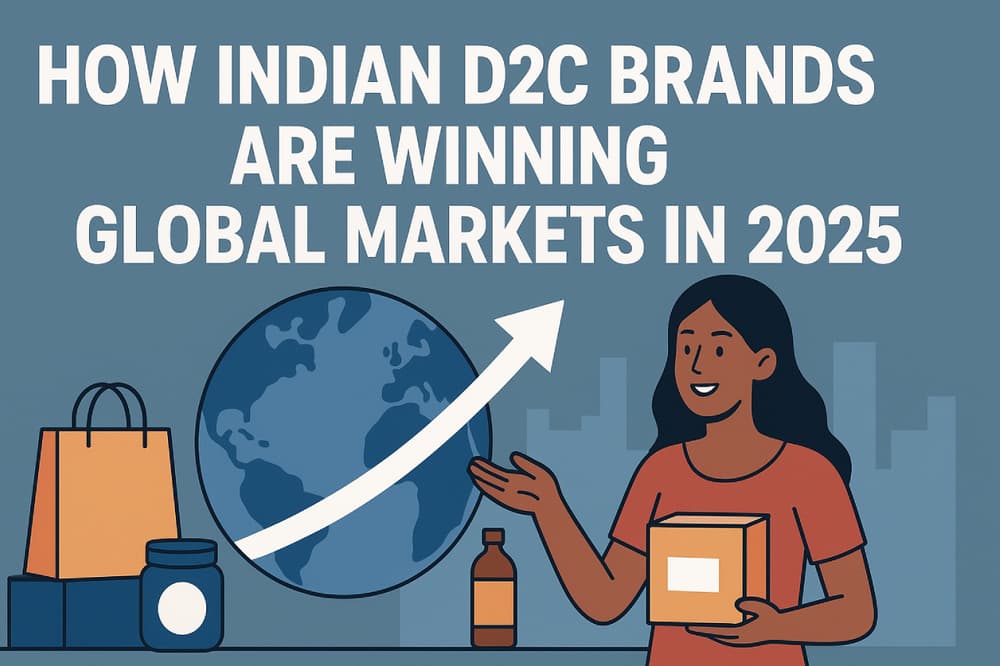India’s D2C market is booming, transforming how brands connect with consumers. Fueled by e-commerce, logistics, and social media, this digital revolution is set to surpass $100 billion by 2025, redefining retail in India.
How Indian D2C Brands Are Winning Global Markets in 2025
Written by Shraddha Ajay Vaviya

The direct-to-consumer (D2C) ecosystem in India has experienced huge expansion in recent years, and this has changed the way brands engage with consumers.
Starting with only a few digital-first startups, it has now become a booming industry valued in the billions. Post-2020, the rise of e-commerce, logistics improvements, and social media marketing have all played into this growth.
The D2C market in India is expected to be greater than $100 billion by 2025. This is a huge shift in how consumers are buying and how brands are selling.
A wave of Indian startups going global across sectors, like beauty, electronics, and fashion. Brands like mCaffeine, Boat, and Mamaearth have gained visibility.
- mCaffeine, a brand that specializes in skincare formulated with coffee, has expanded into the Middle East and European Markets, promising a clean, vegan appeal for current consumers.
- Boat, India's own audio brand, has entered the competition against established competitors by offering innovation at a low cost with a stylish design.
- Mamaearth, known for its toxin-free personal care products, has expanded to the UAE and Singapore, among other locations, tapping into the increased global interest in sustainable beauty products.
These brands illustrate how direct to consumer India models have allowed entrepreneurs to scale without having to work heavily through traditional retail distribution.
The speed of online sales, coupled with high-quality digital branding, made it easier and cheaper to expand internationally.
A decade ago, Indian products were usually viewed as cost-effective but not necessarily premium. Now this perception is changing fast. The new generation of Indian consumers and, increasingly, global audiences, are more demanding of authenticity, quality, and transparency.
D2C brands have established this trust by providing high-quality, cruelty-free, and sustainable products that comply with global standards.
The term "Made in India" has come to be seen as a source of innovation, eco-consciousness, and affordability, which are all key considerations for foreign buyers considering Indian products.
Redseer Strategy Consultants has released a recent report projecting that over 80% of D2C brands from India will take their brand global by 2027, which indicates a significant shift in trust and brand equity on a global consumer level.
The digital-first strategy of Indian brands is one of the primary drivers of this global breakthrough. These startups realized from the start that their customers lived online, whether on Instagram, YouTube, or other digital spaces.
D2C brands do not rely on costly television advertising but instead use influencer partnerships, user-generated content, and data-driven marketing. This tactic enables them to connect with niche audiences, engage authentically, and ultimately grow internationally with little overhead.
For example, Boat’s partnerships with youth icons and gaming influencers helped it connect deeply with Gen Z consumers, while Mamaearth’s storytelling around “toxin-free beauty” resonated with conscious customers worldwide.
As the CEO of Mensa Brands, Ananth Narayanan, recently mentioned, “In India’s D2C ecosystem, we are no longer following trends. We are setting trends around the world through tech, storytelling, and innovation.”
The success of D2C brands in India 2025 isn’t just about revenue, it’s about transformation. It is a matter of enabling transformation. Indian entrepreneurs have used technological tools, their creativity, and cultural familiarity to create brands that speak to people globally.
Given strong manufacturing, international logistics support, and a young, digitally adept workforce, India is now among the top global hubs for direct-to-consumer innovation.
As more Indian brand success stories emerge on the global stage, we are on the point of a new wave of entrepreneurship, one that mixes local roots with global ambitions. The world is taking note as Indian D2C startups are changing what it means to go global, and 2025 is their big year.